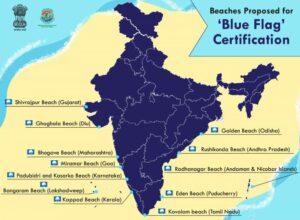In News
For the first time, eight Indian beaches have been recommended for the coveted International Blue Flag eco-label certification. The recommendations made by an independent national jury comprises eminent environmentalists and scientists. Blue flag beaches are considered the cleanest beaches in the world.
Features of Blue Flag
- The iconic Blue Flag is one of the world’s most recognised voluntary eco-labels awarded to beaches, marinas, and sustainable boating tourism operators.
- In order to qualify for the Blue Flag, a series of stringent environmental, educational, safety, and accessibility criteria must be met and maintained.
- Central to the ideals of the Blue Flag programme is the aim of connecting the public with their surroundings and encouraging them to learn more about their environment.
- It is operated under the auspices of the Foundation for Environmental Education and is headquartered in Copenhagen, Denmark.
- In 2001, European Blue Flag became the International Blue Flag. South Africa was the first country to join the Foundation for Environmental Education.
- According to the Ministry of Environment, a ‘Blue Flag’ beach is an eco-tourism model to provide tourists clean and hygienic bathing water, facilities/ amenities, safe and healthy environment and sustainable development of the area.
- The certification is awarded based on 33 stringent criteria in four major heads
. environmental education and information
. bathing water quality
. environment management and conservation
. safety and services in the beaches.
- The jury also awarded India a third prize under international best practices for control of pollution in coastal regions.
- The eminent international jury comprises members of the United Nations Environment Programme (UNEP), United Nations World Tourism Organization (UNWTO), Foundation for Environmental Education (FEE) and International Union for Conservation of Nature (IUCN).
- Earlier this year, the Centre issued an Extraordinary Gazette Notification declaring a list of activities and facilities that would be permissible in the Coastal Regulation Zone (CRZ) areas of certain beaches, which had been identified for obtaining the ‘Blue Flag’ certification:
. Grey water treatment plant
. Portable toilet blocks, change rooms and shower panels
. Solid waste management plant
. Purified drinking water facility
. Seating benches and sit-out umbrellas
The notification also said that the activities and facilities would be exempt from prior clearance under the provisions of CRZ Notification, Island Protection Zone Notification and Island Coastal Regulation Zone Notifications.
Selection of Indian Beaches
- The announcement came on the eve of International Coastal Clean-Up Day, which is being celebrated with 100 countries since 1986.
- The eight beaches are
. Shivrajpur in Gujarat
. Ghoghla in Daman and Diu
. Kasarkod and Padubidri beaches in Karnataka
. Kappad in Kerala
. Rushikonda in Andhra Pradesh
. Golden Beach in Odisha
. Radhanagar beach in Andaman and Nicobar
Features of Kasarkod and Padubidri Beaches
- Kasarkod and Padubidri beaches have
. grey water treatment plants
. solid waste management plants
. disabled-friendly equipment to enable them to enter seawater
. seating arrangements
. clean drinking water
. washroom, changing room, bathing facility
. disabled-friendly and general toilets
. parking facilities
. solar power plant, solar lighting
- A 750-m-long safe swimming zone has been created in Kasarkod, which is 2.5-km long.
- There is a facility for sun bath, the beach has a gym, children’s play area, a watch tower.
- The government has spent about ₹8 crore to develop the beach in the past two years.















